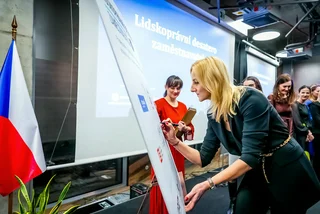Ask any business leader about major topics on the agenda for 2024, and the rise of Artificial Intelligence (AI) is sure to be on the list. The rapid development of AI was brought to the world’s attention last year by the introduction of OpenAI’s ChatGPT-4, and now, businesses are scrambling to figure out the possible rewards and risks.
Although AI has existed in various forms for the past few decades and has been at the forefront of digital transformation for some time, its true potential is only now being understood. When it comes to generating human-like content and emulating human creativity, AI promises to revolutionize life, especially in the workplace.
As such, investors and organizations are pouring money into AI development like never before. Their urgency is based on an understanding that AI is not just another tool: it’s poised to profoundly transform whole industries – from banking, financial services, and insurance to healthcare, human resources, and marketing – and shape the future of the global workforce.
As an innovation-centric nation with an economy increasingly geared towards professional services, Czechia stands to win big as AI augments human capabilities – but it is also exposed to uncertainty. The Manpower Group, one of the world’s biggest employment agencies, has released a forecast of how AI will impact the future “technology workforce,” examining challenges, possible remedies, and opportunities.
Happy days for AI pros
The rapid adoption of AI has given rise to unprecedented demand for traditional data and AI-related roles. This is a continuation of a longer-term process in which data scientists, data engineers, AI/machine learning (ML) engineers, and AI-ops engineers have become the linchpins for businesses looking to leverage AI. As more AI-driven solutions roll out across industries, “traditional” IT skills will become even more desirable, with organizations eager to make the most of new technologies.
“The data scientist’s expertise in analyzing complex datasets and extracting valuable insights, the data engineer’s role in building and maintaining strong data pipelines, the AI/ML engineer’s ability to design and develop AI algorithms, and the AI-ops engineer’s proficiency in deploying and monitoring AI systems, are all pivotal in the integration of AI into an organization,” Manpower point out.
New roles emerge
While typical IT roles are growing in prominence, new, specialized jobs relating to AI are being created to address the technology’s unique demands. Positions such as Natural Language Processing (NLP) engineers, prompt engineers, AI research scientists, computer vision engineers, generative AI engineers, AI ethicists, and AI auditors are at the spear of AI-related innovation.
NLP engineers, for example, focus on developing AI systems capable of understanding and generating human language. Such abilities are critical for chatbots, sentiment analysis, and language translators. Prompt engineers specialize in crafting prompts for AI models, enhancing their ability to provide precise, tailored responses.
Unpredictable skills shortages
Given the rocketing demand for specialized AI knowledge, AI experts enjoy a strong position in the labor market. Indeed, the talent shortage in AI skills has, according to Manpower, emerged as a critical impediment to AI’s widespread adoption.
“The rapid growth in demand for AI professionals, from data scientists to machine learning engineers, has far outstripped the supply of qualified individuals,” says Manpower.
The gap in demand and supply for advanced analytics and AI roles can be as high as 30-35 percent, according to Manpower, with less than 1 percent of global companies that specialize in AI-based solutions claiming to have a sufficient talent base.
Moreover, companies will continue to contend with rapid development in AI capabilities, leading to uncertainty about which roles or skills will be necessary. Roles such as prompt engineers or generative AI developers and engineers were non-existent a year ago but are now vital for organizations seeking to drive AI innovation.
Repetitive roles at risk
A common fear about the rise of AI focuses on its potential to make some traditional, human-performed roles obsolete. As AI increasingly automates routine, repetitive, or rule-based tasks, it could lead to job displacement in some industries.
According to Manpower, this only emphasizes the need to upskill and reskill the workforce at scale and speed. AI will generate opportunity, create new roles, and demand fresh skills; organizations must prepare by fostering an AI-literate workforce and a culture of “lifelong learning” to ensure they remain relevant and competitive.
Casting the talent net wide
Companies will require new types of workers with different skills to drive AI innovation. As such, the onus will be on HR and recruitment departments to diversify their talent-sourcing channels.
This, Manpower points out, may go hand-in-hand with a more international approach to hiring. Organizations will increasingly need to look beyond their domestic talent pool and seek cross-border talent capable of filling high-demand roles.
In the long term, businesses must strengthen their learning and development ecosystem. After all, building an AI-literate talent pool is the only sustainable solution to the demands of an AI-driven economy; in what Manpower terms “lifelong learning,” companies may need to partner with third-party platforms and technology providers to offer employees a wide range of courses and technology.
AI diversity is key
AI algorithms respond to human input. As such, any biases present in the workforce are likely to feed through into the technology itself. Conversely, an inclusive, diverse workforce will help identify and rectify biases in AI models.
“Organizations should democratize access to learning and development opportunities to build a diverse talent pool that includes women, early career talents and older individuals, ensuring that everyone, regardless of age, gender or background, has an equal chance to learn, grow and contribute to a collective and sustainable future with AI,” Manpower explains.
The potential for AI to transform Czech workplaces brings significant demands on companies’ ingenuity and agility. At the same time, according to Manpower, sweeping changes to how we work will require even greater emphasis on social responsibility, ensuring that workers are armed to face an uncertain technological future.












 Reading time: 4 minutes
Reading time: 4 minutes 




















